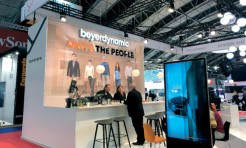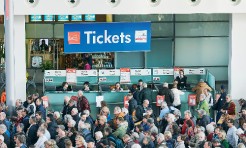Imex/Conventions: Finger always on the pulse
The world is coming together again in Frankfurt – from 19 to 21 April for IMEX. The trade fair sees itself as a pace-setter for the further development of the meetings industry.

Nothing is as constant as change – or as exciting. When radical changes and shifts in perspective result in new opportunities, innovative business ideas and significant trends, market players have to open their eyes and pay close attention. That certainly applies, for example, when it comes to the sharing economy – a trend that is sweeping along more and more people all over the world. What does it mean for the MICE industry? How can the essential idea behind the sharing economy be adapted, and what initial, concrete steps can be taken? How will this trend change the way we travel? “We want to get to the bottom of questions like this in Frankfurt this year in a range of workshops and seminars and with a podium discussion,” explains Carina Bauer, CEO of the IMEX Group.
The sharing economy involves the systematic lending and borrowing of objects and reciprocal arrangements where rooms or space are made available, in particular by private individuals or interest groups. In the travel sector, the idea has already had a major impact on consumers’ behaviour thanks to business concepts like those of Airbnb, Uber, Bookalokal, Splacer or Vizeat. The total value of the sharing economy globally will grow by a factor of 20 to 335bn US dollars by 2025, forecasts auditing company PricewaterhouseCoopers.
In addition to the sharing economy, which is a major theme of the show, sustainability and corporate social responsibility (CSR) are also playing an important role at IMEX in Frankfurt in 2016. “We are seeing a process of professionalisation in the industry – a move away from action taken with an operations-oriented focus and towards a strategic approach,” says Bauer. “That means that companies are increasingly making CSR part of their overall strategy in order to add value.” This is happening, for example, in marketing, staff development, staff recruitment and quality management.

CSR tours have been developed for IMEX that take participants to selected, in some cases prize-winning, exhibitors at the trade fair. Participants learn from experts how MICE providers are developing their CSR strategies and projects in practice. The examples range from the “corporate happiness strategy” of a hotel chain to the positioning of an entire region as a sustainable destination. “For the first time we are also offering a sustainability tour,” explains IMEX boss Bauer. It includes the prize-winning Kap Europa, Messe Frankfurt’s new conference centre, which was designed entirely on sustainable principles. IMEX itself also has a sustainable approach, of course, with its own CSR strategy. “Our Badge Back programme raises funds annually to support local social projects such as Lichtblick, a home for people who were previously homeless.”
Showing humanity and treating each other well is also part of this trend. “Direct, face-to-face contact from person to person is more important than ever. That is demonstrated by the continual growth of the event industry in the age of video conferencing and Skype,” explains Bauer. In marketing, too, the personal approach is currently state of the art. Both consumers and employees want to be addressed personally. The cola can with your own name on it, the sports shoe with the photo you have taken printed on it or the muesli created to your own recipe – these are some of the responses multinationals are making to this trend. It is an approach that adds value by recognising the individual. IMEX itself is also doing this with a more flexible hosted buyer programme, for example. For the first time people now have the option of choosing the duration of their stay and shaping the programme.
“We see many interesting concepts and approaches among our exhibitors as a result of these trends,” emphasises Bauer. New start-ups are constantly being formed these days, she says. That’s why since last year there has been an IMEX competition (IMEXpitch) for event technology start-ups. Start-up founders get the opportunity to pitch their concepts and ideas. “There is an attractive marketing package for the winner.” Last year’s winner was InitLive, a software company from Canada with an innovative all-in-one software solution that runs on mobile devices and allows the deployment of staff and volunteers at events to be planned and coordinated. “We also have a separate section at the trade fair, the Technology Pavilion, where innovative event technology companies can present their products,” explains Bauer. You can experience the state of the art almost everywhere at IMEX. There are over 180 training and further training units. The aim is to meet the personal and business requirements of everyone who takes part. As part of this, there are now also short talks on trends and future-oriented thinking. The venue for this is well chosen: The seminars take place at the Inspiration Hub (www.imex-frankfurt.de).
Author: Karin Fink
This article was published in TFI issue 2/2016
Share in Facebook, Twitter or Google+:
TFI - Trade Fairs International - The International Trade Fair Magazine.
© 2006 - 2024 by TFI-Verlagsgesellschaft mbH. All rights reserved. TFI-Verlagsgesellschaft mbH shall accept no responsibility for the contents of external links and other contents.
TFI-Know-how
-
What to do when things go wrong at virtual or in-person events?

In the event world, it’s simply part of life if things don’t work out as planned.
-
How can networking be made to work at online events?

Networking typically happens at real, in-person events. But it’s also possible to do it online; it just works a little differently. There are various options available to organisers.
-
How can exhibitors stand out at trade fairs?

New products and a well-conceived stand design are not the only drivers for a successful presence. Many other factors are also important, but trade fair planners often lose sight of them.
-
How can industry decision-makers be reached online?

Trade fairs and trade fair companies need to constantly further develop, become more agile and flexible and offer services all year round. New, digital offerings are very important here. With its TrustedTargeting technology, Messe München offers its customers access to leading business-to-business decision-makers on the Internet.


